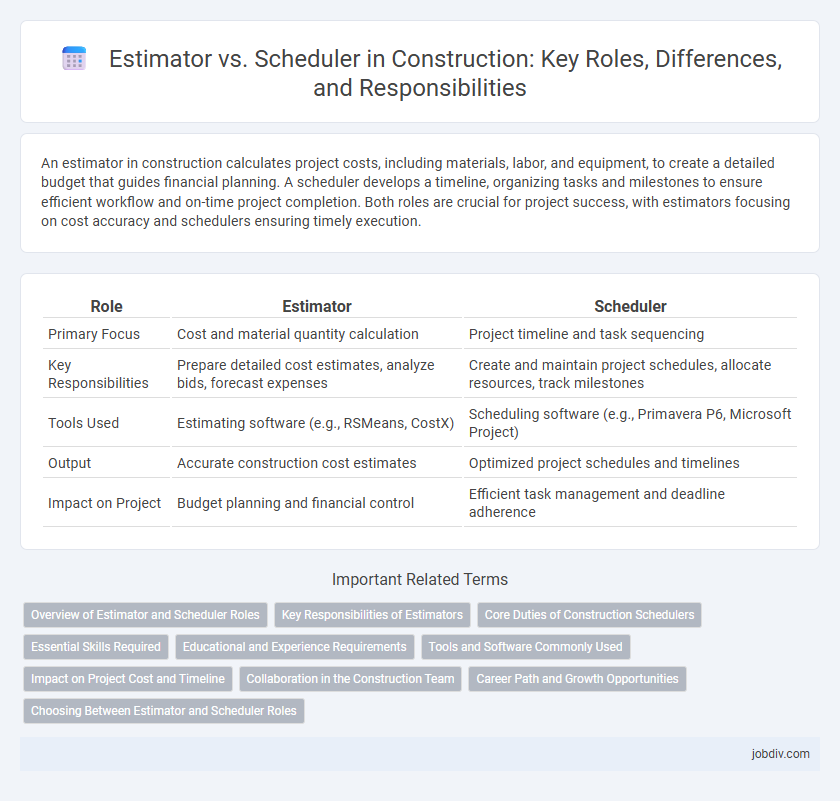An estimator in construction calculates project costs, including materials, labor, and equipment, to create a detailed budget that guides financial planning. A scheduler develops a timeline, organizing tasks and milestones to ensure efficient workflow and on-time project completion. Both roles are crucial for project success, with estimators focusing on cost accuracy and schedulers ensuring timely execution.
Table of Comparison
| Role | Estimator | Scheduler |
|---|---|---|
| Primary Focus | Cost and material quantity calculation | Project timeline and task sequencing |
| Key Responsibilities | Prepare detailed cost estimates, analyze bids, forecast expenses | Create and maintain project schedules, allocate resources, track milestones |
| Tools Used | Estimating software (e.g., RSMeans, CostX) | Scheduling software (e.g., Primavera P6, Microsoft Project) |
| Output | Accurate construction cost estimates | Optimized project schedules and timelines |
| Impact on Project | Budget planning and financial control | Efficient task management and deadline adherence |
Overview of Estimator and Scheduler Roles
Estimators analyze project plans, specifications, and resources to calculate accurate cost projections, ensuring budget feasibility and competitive bidding. Schedulers develop detailed timelines, coordinate labor, equipment, and materials to optimize project flow and meet deadlines. Both roles collaborate closely to balance cost efficiency with timely project completion in construction management.
Key Responsibilities of Estimators
Estimators in construction are responsible for analyzing project plans, specifications, and materials to generate accurate cost projections and budgets. They quantify labor, equipment, and material needs while evaluating potential risks to ensure financial feasibility. Precise cost estimation directly influences bidding success and overall project profitability.
Core Duties of Construction Schedulers
Construction schedulers develop detailed project timelines, coordinating tasks to ensure timely completion while monitoring progress against schedules. They analyze dependencies and allocate resources efficiently to prevent delays, optimizing workflow and sequencing activities. Their core duties include updating schedules, reporting status changes, and collaborating closely with project managers to maintain alignment with overall construction goals.
Essential Skills Required
An estimator requires strong quantitative analysis skills, proficiency in cost management software, and an in-depth understanding of construction materials and labor costs to accurately forecast project expenses. A scheduler must excel in time management, use advanced scheduling tools like Primavera or MS Project, and have the ability to coordinate multiple tasks and resources to ensure timely project completion. Both roles demand excellent communication and problem-solving skills to effectively collaborate with project managers, contractors, and stakeholders.
Educational and Experience Requirements
Estimators typically require a background in construction management, engineering, or a related field, with proficiency in cost analysis, quantity takeoff, and software such as AutoCAD or specialized estimating tools; most employers seek candidates with 3-5 years of relevant experience. Schedulers often need expertise in project management software like Primavera P6 or Microsoft Project, and a solid understanding of construction sequencing and critical path method (CPM) scheduling, supported by experience ranging from 2-4 years. Both roles benefit from certifications such as Certified Professional Estimator (CPE) for estimators and Project Management Professional (PMP) or Scheduling Professional (PMI-SP) for schedulers to validate skills and knowledge.
Tools and Software Commonly Used
Estimators predominantly use software like ProEst, Sage Estimating, and PlanSwift to generate accurate cost projections and material takeoffs, enhancing budget accuracy and bid competitiveness. Schedulers rely heavily on tools such as Microsoft Project, Primavera P6, and Asta Powerproject to create detailed timelines and resource allocation plans that optimize project workflow. Both roles increasingly leverage BIM-integrated software like Autodesk Revit and Navisworks for collaborative planning and real-time data sharing.
Impact on Project Cost and Timeline
Estimators analyze project blueprints and specifications to calculate accurate cost projections, directly influencing budget allocation and risk management, while schedulers develop detailed timelines that sequence tasks efficiently to prevent delays and reduce overhead expenses. Effective collaboration between estimators and schedulers optimizes resource utilization, controls project expenditures, and ensures timely completion. Poor coordination can lead to cost overruns, schedule conflicts, and compromised project quality.
Collaboration in the Construction Team
Effective collaboration between estimators and schedulers is critical for successful construction project management, ensuring accurate budget forecasting and realistic timelines. Estimators provide detailed cost analysis while schedulers develop sequencing plans that align resource allocation with project milestones. Synchronizing these roles enhances communication, reduces risks of delays and cost overruns, and drives cohesive teamwork across the construction team.
Career Path and Growth Opportunities
Estimators specialize in project cost analysis and budgeting, offering career growth into roles like senior estimator, project manager, or cost control manager, often requiring strong analytical and negotiation skills. Schedulers focus on project timelines and resource allocation, progressing toward positions such as planning manager, project controls manager, or operations director, with expertise in software tools like Primavera or MS Project. Both paths provide opportunities for advancement but differ in skill sets: estimators emphasize financial forecasting, while schedulers prioritize timeline optimization and risk management.
Choosing Between Estimator and Scheduler Roles
Choosing between estimator and scheduler roles in construction depends on project priorities; estimators focus on accurate cost forecasting and resource allocation, while schedulers emphasize timeline optimization and task sequencing. Estimators analyze material, labor, and equipment costs to create detailed budget proposals, whereas schedulers develop critical path method (CPM) schedules to ensure timely project delivery. Effective project management requires aligning the choice with the phase of construction and specific project demands to balance cost control and schedule adherence.
Estimator vs Scheduler Infographic

 jobdiv.com
jobdiv.com